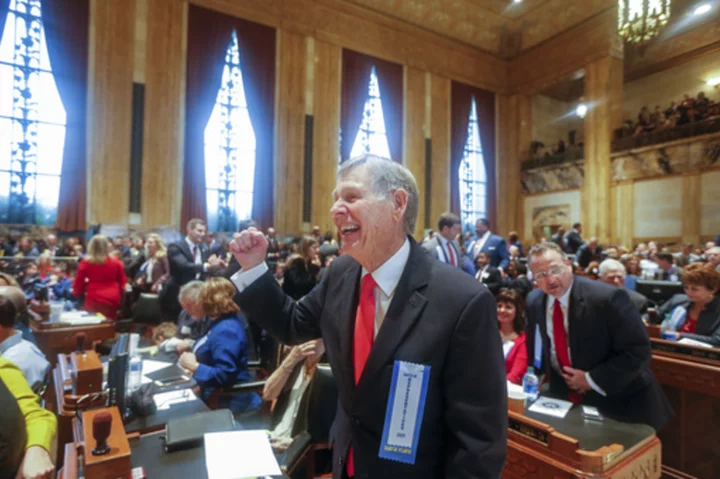JEFFERSON CITY, Mo. (AP) — Lawmakers in state capitols this year have been flexing their superpowers.
In North Carolina, a new supermajority of Republicans enacted abortion restrictions. In Vermont, a new supermajority of Democrats imposed a climate-sensitive home heating law. And in Montana, a GOP supermajority booted a transgender lawmaker from the House floor.
In each case, the views of their political opponents ultimately were irrelevant.
By at least one measure, political power is at its highest mark in decades. That's because Republicans or Democrats hold majorities so large in 28 states that they could override gubernatorial vetoes without any help from the minority party.
“Supermajorities give one party a lot of power to do what they want to do,” said Steven Rogers, a political scientist at Saint Louis University who focuses on elections and state legislatures.
There is no single standard for a supermajority, though the term generally is equated with whatever threshold is needed to override a gubernatorial veto. In many states, that’s a two-thirds majority. In some, that’s a three-fifths majority. In six states — Alabama, Arkansas, Indiana, Kentucky, Tennessee and West Virginia — it takes only a simple majority to override a veto. But those states all have Republican majorities around 70% or greater — easily exceeding any definition of a supermajority.
The number of states with supermajorities is at its highest level since at least 1982, with 19 Republican supermajorities and nine Democratic ones, according to research by Rogers.
This year began with supermajorities in 26 legislatures, including new Republican ones in Florida and Montana and a new Democratic one in Vermont. That total grew in March when Louisiana state Rep. Francis Thompson — who had served nearly 50 years as a Democrat — switched to the Republican Party to give the GOP a supermajority. Thompson cited his conservative voting record while asserting that Democratic leaders were pushing issues that didn't align with his Christian values.
In April, North Carolina state Rep. Tricia Cotham switched from Democrat to Republican to give the GOP another supermajority. Six weeks after Cotham's switch, she provided a pivotal vote as the new GOP supermajority overrode Democratic Gov. Roy Cooper's veto of legislation banning most abortions after 12 weeks of pregnancy.
Some North Carolina Republicans already are eying other proposals they could pass with a supermajority, including an elections bill containing provisions that Cooper previously vetoed and an expansion of taxpayer-funded vouchers for students to attend private schools.
The supermajority creates an opportunity to “adjust the playbook” to ensure "that we are scoring more touchdowns, so to speak, than we might have previously,” said North Carolina Republican state Rep. John Torbett, chair of an education committee.
The new Republican supermajority in Louisiana also could soon be put to the test.
Democratic Gov. John Bel Edwards has said he intends to veto a package of bills that targets the LGBTQ+ community, including a ban on gender-affirming treatments for transgender minors. Louisiana lawmakers have convened for just two veto sessions since 1974. But Republicans now have the two-thirds majority necessary to override an Edwards veto.
Vermont's Democratic-led legislature is to return to the Capitol next week to consider overriding vetoes by Republican Gov. Phil Scott, including one of a bill expanding child care subsidies for some families. The Democratic supermajority already notched one victory in May — overriding Scott's veto of a clean-heating-standard bill that credits utilities for energy-efficient technologies and penalizes them for not meeting certain goals.
Scott vetoed a similar bill last year before Democrats obtained a supermajority, but an override failed by one vote in the House.
Republican-led legislatures in Kansas and Kentucky this year also overrode vetoes by Democratic governors, including on bills dealing with transgender issues, abortion and work requirements for food assistance.
Political scientists cite a couple of reasons for the rise of supermajorities.
Over the past decades, Americans have increasingly voted along party lines — picking state lawmakers and even local officials who align with their party choice for president or the top of the ticket, Rogers said. At the same time, politicians in power in many states have gerrymandered voting district boundaries to give their party’s candidates an advantage in legislative elections.
As parties gain more seats in House and Senate chambers, the political ideology of their middle members often shifts further to the right or left, reducing the need to appeal to moderates and virtually eliminating the need to compromise with the opposing party.
“All that we have is our voice,” said North Carolina state Rep. Marcia Morey, a Democratic whip. But now “there’s no need for (Republicans) to have any dialogue.”
Parties with supermajorities also can more easily silence their opponents. In Tennessee, where Republicans hold at least three-fourths of the seats, the GOP supermajority expelled two Black Democratic lawmakers who used a bullhorn on the House floor to protest for gun control after a deadly school shooting in Nashville. Democrats also were upset Republicans had limited debate on various topics.
Following Tennessee’s expulsions, Montana's Republican supermajority banned transgender Rep. Zooey Zephyrfrom the House floor. Zephyr initially was silenced after telling lawmakers supporting a prohibition on gender-affirming treatments for minors that they would have blood on their hands; she was exiled for participating in a protest over her right to debate in the House.
When supermajorities run state capitals, some voters may be pleased by the sweeping policies that get enacted. Others may feel like their priorities are ignored.
“On behalf of the voters, it might be a good thing, because it helps clarify responsibility,” said Carlos Algara, an assistant professor of government and politics at Claremont Graduate University in California.
“If you are a voter in California, you know explicitly which party owns policy – it’s the Democratic Party," Algara said. "So if you don’t like the direction of policy in California, you have a very easy choice.”
Voters in Florida are in a similar situation with Republicans. GOP Gov. Ron DeSantis helped build a Republican supermajority by becoming more involved in legislative races, and the candidates he backed remained firmly loyal during this year's legislative session.
DeSantis had no problem passing a legislative agenda that included a six-week abortion ban, tougher immigration laws, more power for parents to remove books from public schools and an easier ability for prosecutors to win death sentences, among other things. He now is campaigning on that agenda as he runs for president.
House Democratic Leader Fentrice Driskell said DeSantis "changed the vibe” in the Capitol. She recalled that lawmakers last year had included limits on how the governor could use funds in an emergency management bill.
“That was when they did not have a supermajority," Driskell said. "This time, we didn’t see anything that would be a check on his power.”
___
Associated Press writer Brendan Farrington, in Tallahassee, Florida, and Gary D. Robertson in Raleigh, North Carolina, contributed to this report.









